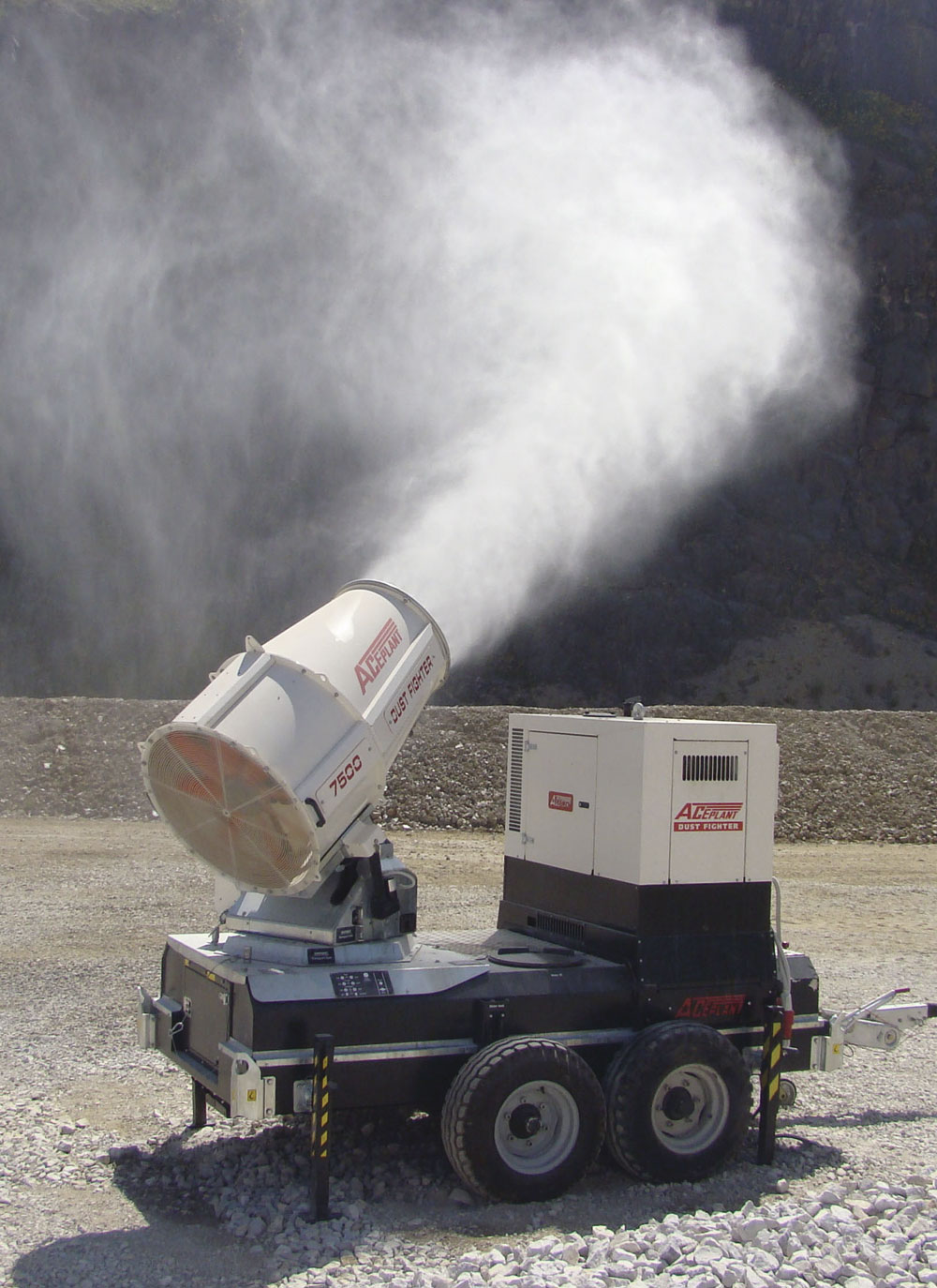A New Breed

Latest fan-based dust-control equipment offers greater efficiency and economy
By Keith Whitlock, national sales manager, ACE Plant
Traditional dampening-down methods of dust control work reasonably efficiently on haul roads and stockpiles, but once dust becomes airborne such procedures are rendered futile.
Rain guns, for example, use a lot of water yet offer little benefit in such circumstances. The reason for this can easily be explained by considering the nature of dust itself.
The average dust particle measures 80 microns, while the water droplets produced by the rain gun or other standard system are around 1,000 microns. As a result, the water droplets are too big to collect many of the dust particles from the dust cloud as they pass through it (see fig. 2).
Modern-day understanding of the health and safety hazards presented by dust has led to the development of an entirely new breed of dust-control equipment that overcomes the problem of airborne dust by artificially reproducing a natural phenomenon.
Water is pumped through nozzles and directed into the airstream of a powerful fan which produces a fine mist of tiny water particles from 40 to 120 microns. These collide with, and easily capture, the 80 micron dust particles, thereby removing them from the atmosphere (see fig. 4).
Depending on the model in use, the mist produced is effective over a distance of up to 95m and to a height of up to 80m (see figs 5 & 6), so with an automatic swivel facility the area covered can be as much as 25,000m2 (equivalent to the size of three and a half football pitches). Water usage is also significantly lower; for example, a traditional rain gun will use up to 2,000 litres/min, whereas fan-based machines can use as little as 12 litres/min.
The concept is actively being developed by several manufacturers with the largest fan-based unit on which information is currently available claiming to offer a maximum reach of 210m, although, to date, a machine of this capability has not been seen in the UK.
Trials carried out under controlled conditions by primary health and environmental organizations show a substantial decrease in atmospheric dust (a minimum of 50% in the worst operating conditions), but the benefits of the system do not stop there.
Thanks to the much lower volume of water used, fan-based machines eliminate the creation of mud on site, while reduced dust levels mean a reduction in maintenance costs for other site equipment.
Operators also welcome the fact that fewer site personnel are tied up on dust-control duties, while a bonus benefit reported by users is that the misty conditions created by the fan-based machine have the effect of reducing the site temperature by up to 4°C.
While most models currently available are aimed firmly at the demolition industry and require mains water and electricity supplies, thereby making them inappropriate for use in many quarrying applications, the latest development from Milton Keynes-based ACE Plant incorporates an on-board generator and 2,000-litre capacity stainless steel water reservoir (see fig. 7), making it suitable for use on any quarry site.
The Dust Fighter is based on a powerful three-phase electric fan and has a range of up to 95m in windless conditions. Mounted on an easily transported, rugged four-wheel chassis, it features automatic 330° rotation for accurate all-round targeting. Options include remote control for water ‘on’ and ‘off’, while oscillation and raise/lower functions are available in either automatic or remote-control mode.
Without doubt, the use of Dust Fighter or similar equipment will have a strong resonance with public health and environmental control bodies, although the advantages of greater all-round efficiency and economy are also likely to be persuasive reasons for any quarry operator to investigate this new breed of machines.
For further information visit: www.ace-parts.co.uk


